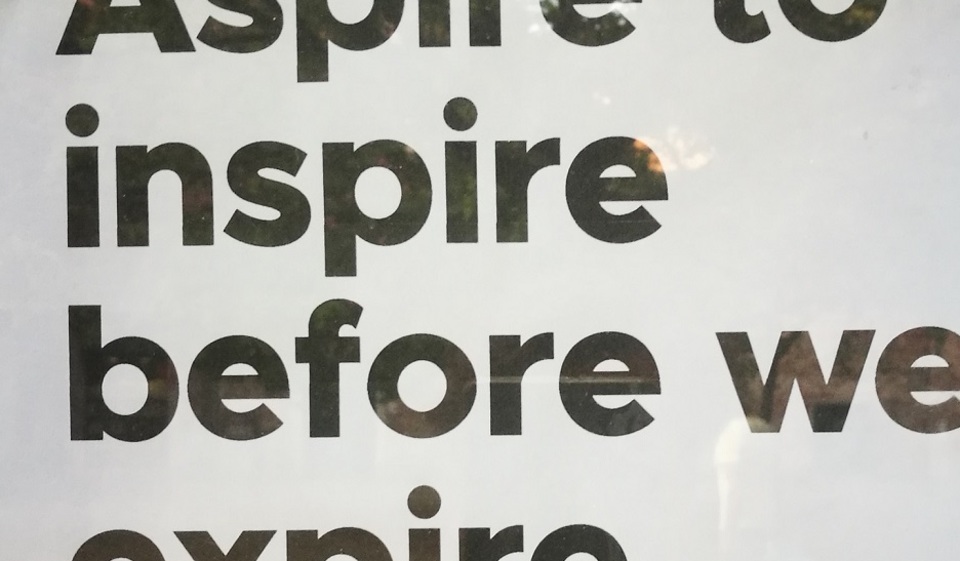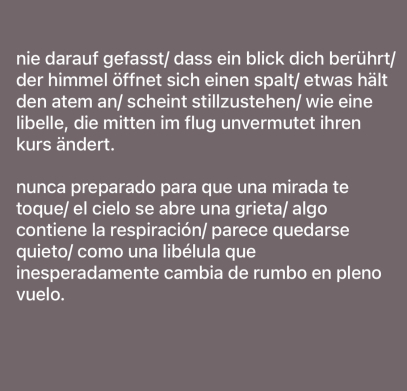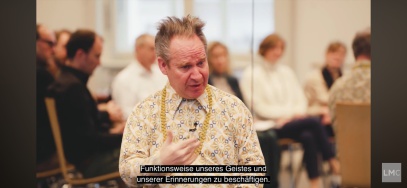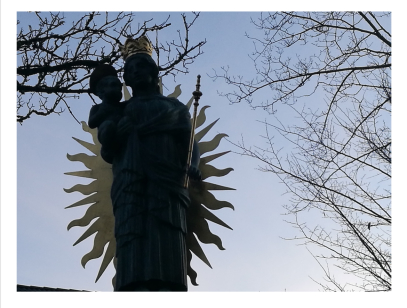
InnenAnsichten- in english
Veteranos del amor.
15.01.2024
AI doesn't write poetry, but it makes mine (translations) better. I co-created the writing of the poem below and its translation with deepl.com, so to speak - does that make me any less the author of my text?
The writing process began in Spanish. I then endeavoured to find a tone in German that would convey the mood. On both sides of the transfer, on both banks of the poetic river, so to speak, the whole thing collapsed...the images weren't right, the flow of speech was bumpy, it sounded crooked..
I patiently turned to the failed heap of words again and again, collected words like driftwood, freed them from mud, turned them round, turned them over and put them in their place. It was interesting that deepl. gave me different suggestions to play with depending on the time of day.
The retranslation from Spanish brought out new facets, gross blunders, total misunderstandings. In rewriting the translation of the translation - now my own again - I came closer, layer by layer, to what I wanted to say.
In the end, only a native speaker can judge how well the whole thing went in Spanish...I certainly learnt a lot, not just new vocabulary.
Part of the fascination of a foreign language is that every language offers different possibilities, but also sets its own limits. The fact that one and the same emotional state, clothed in different idioms, conveys completely different philosophies and perspectives on life...
anyway: a poem a day keeps the doctor away.
How is your heart?
read the full poem and more poems here: poetry
deeply human: Peter Sellars on leadership
24 Dec. 2023
Meeting Peter Sellars in person and experiencing him at work with the soloists of the "Indian Queen" production (Salzburg Festival) is one of the gifts that the past year 2023 has given me.
Even more so because he really lives what he formulates in his leadership keynote: generosity, compassion, acceptance, depth. He talks about the importance of beauty for our humanity, the opportunity
that art should offer us to open up as human beings, to develop, to be there for each other and to contribute something. The responsibility that this also gives us artists.
At the end of a year that was full of encounters and experiences, many very beautiful and fulfilling, some also devastating and questioning everything - it was what I needed to hear to be able to
believe again that it is worth taking a difficult path, a path that cannot be taken for granted.
That it is worth looking behind the masks, first and foremost behind my own. In the Buddhist sense, being human and becoming human is practice. An exercise. Learning that never ends. The courage to
be vulnerable and to feel everything. And to share this with others through whatever medium in order to overcome division, violence, speechlessness, insensitivity, lack of imagination and lack of
love together.
Yesterday was the first rehearsal for the Christmas family concert this afternoon at the Isarphilharmonie. I arrived at the rehearsal frustrated, sad and listless. At the first note of the soprano
saxophone I was suddenly awake, my heart opened up. I was able to feel gratitude and joy again. That I am allowed to make music, that other musicians and artists continue to build me up, touch and
inspire me with the beauty, sounds, images, words and food for the soul that they give us all.
I wish us all peaceful and contemplative holidays...the greatest gift is life itself. Not only the mystical being born or reborn in Jesus, in the light, but life itself, our life here, our being
broken and thrown into beauty and violence.
https://www.youtube.com/watch?v=JR7gYWa0QaQ
________________________________________
I prefer that everyone really sings, rather than saying from the start: Don't sing, only half sing or sing like this.
Conductor and choirmaster Mathieu Romano on the ideal choral sound and technique, which is only ever a means to an end, even when conducting.
https://van-magazin.de/mag/mathieu-romano/
by Dominika Hirschler 6 December 2023
As a choral conductor, Mathieu Romano pursues his passion for voices and human sound with great curiosity and versatility across all genres, styles and eras. The ensemble he founded, Aedes, does not specialise in a specific repertoire, but in a particular sound, the tools and reflexes of an a cappella ensemble.
As a singer in the Det Norske Solistkor, I was able to observe Mathieu Romano and his unconventional way of teaching during a masterclass in choral conducting in Oslo.
Attentive, focussed and temperamental, he challenged the participating choir conductors to dare to be expressive and to expand their expressive spectrum beyond the "right" beat.
My video call reached him a few weeks later.
VAN: 'I really like voices and I want the singers to really sing', you once said in an interview. What do you mean by that?
Mathieu Romano: Sometimes I hear vocal ensembles in which the sopranos have a very good sound but are forced to sing with half a voice, without vibrato, without support, without body sound. That doesn't interest me. I want to hear physicality and vocal development. Of course, this is different in the Brahms Requiem than in Poulenc's Stabat Mater, for example. It's always about finding a balance that is adapted to the style, i.e. being able to sing non-vibrato or covered or without timbre, as a colour.
Basically, I prefer that everyone really sings and that you gradually come together in a sound by listening, rather than saying from the start: 'Don't sing, only half sing or sing like this'. That takes time and a stable ensemble, the will to really listen to each other. With patience and dedication, the balance between giving sound and finding yourself together in the sound has to be balanced again and again. Expressivity is very important to me. I want singers and choirmasters to take risks.
Politically speaking, I refuse to be like some conductors who hire young sopranos and then throw them out again after ten years. Singers are not disposable objects. You have to respect the singer's body. That's very important to me.
How do you approach a particular musical era and its style?
Working on the style is above all working on the text to convey the message of a literary text. I never work on scores just because I think of a beautiful sound, a beautiful musical material. The text always comes first, even if there isn't one.
For example, I recently prepared an excerpt from the opera Einstein on the Beach by Philip Glass. There is a text, but it's just numbers, 1 2 3 4, five minutes long. So if you only rely on that, you quickly reach your limits. But there is an idea behind it, the repetition, the shift, all of which have a meaning.
And what role does sound play then?
It is the search for the ideal, for beauty of sound, purity of tone, brilliance, transparency and at the same time for great emotion in the service of the text. It's complicated to immerse yourself deeply in the text and the emotions of the text and at the same time produce a wonderful sound, but that's the goal.
How do you work on sound in practice?
No secret: we really try to rehearse a lot. Unfortunately, we never rehearse enough because there isn't enough money.
I work a lot on getting the singers to listen to each other, to get used to each other's sound, to the resonance and the brilliance that lies in the overtones. For me, this creates true homogeneity, stable intonation and a clear sound.
A sound that is harmonious like a Nordic choir, solid like a German choir and passionate like a Mediterranean ensemble. That's how you once described the ideal choral sound on Radio France.
Some Nordic choirs from Sweden and the Baltic States have a beautiful sound and lustre. Sometimes perhaps a little cool. There are German choirs that have a kind of structure and solidity that makes you think that no matter what comes, it will remain stable. And there are Mediterranean choirs that sing with a lot of warmth and passion, but where the quality of the sound leaves something to be desired.
I realise that this is impossible, because we are also dependent on our culture, we are dependent on many things.Nevertheless, I like this utopic idea of seeking a lot of purity, a lot of precision and at the same time something very passionate and warm.
As a teacher, how do you manage to inspire someone to express themselves, to show themselves emotionally and to overcome inhibitions in the process?
My vision of teaching is to be very encouraging, to instil confidence. I prefer to ask questions rather than give instructions. For example: What is the feeling you want to convey, what is the character you envision? What is going on inside you right now, what does this music, this text trigger in you?
Teaching the technique is not the actual purpose of the lesson. For example, if you want something restless and wild, then show something restless and wild, but don't just show a lift, a four-four time, because that doesn't convey the feeling or the energy.
The technique is about managing to be free enough in your body and mind to go beyond just doing one, two, three, four with your arms. It's about returning to the spontaneity of what you want to express. Of course, that's easy to say. Ultimately, all of this has to be framed in technical gestures, but these are quite easy to learn.
The role of the teacher is the mirror: you wanted to say this, but your body expressed something else. Realise this and change it. With many small adjustments, over time you will achieve a little more spontaneity and a match between what a conductor thinks and what he or she shows.
Where does the path lead to an artistically and humanly fulfilling result?
That's a big question and I don't think I have the answer. But I think it helps if you allow the singers to sing with their full voice on their bodies as often as possible. So that they don't become dissatisfied with singing in a team and don't have to hold back all the time.
What is constructive for lively work, an open and creative process?
It's about listening to others, in their verbal communication, in their way of being, in what they suggest, also in their way of singing. Taking in what you hear and then shaping it naturally, but not rejecting everything across the board, modelling it together. To say to each other: We are together - ensemble! - and we listen to each other. And if that's the case, the result can only be good.
How do you see your role as a conductor?
I don't like the word 'chef' [choirmasters and orchestra conductors are called 'chef de chant' or 'chef d'orchestre' in French]. I prefer the English or German word conductor or Dirigent: the one who leads.
You're a bit like a bus driver. He is not more important than the passengers, they are two complementary functions that need each other. We all serve the same project. The term boss immediately implies a kind of hierarchical position. Of course, this is also there because he or she ultimately makes certain decisions.
So what is real authority?
For me, it consists of having integrity. A superior has good authority if they can admit that they were wrong. Authority means that you are confident enough to know what you are saying. Having some self-reflection. Having some distance from yourself, accepting criticism, accepting dialogue. With a clear artistic vision. Authority does not come from power or psychological influence.
In the masterclass, you inspired a change of perspective. That as a choirmaster, you shouldn't just ask yourself: What do I want from the singers? But rather: What do the singers need from me?
When we do that, things go well. ¶
FINE
__________________________________________________________
On Langlais "Missa in simplicitate"
Tart, autumnally darkened, neo-archaic, peculiar and idiosyncratic: the great "missa in simplicitate" by Jean Langlais - which, of course, only pretends to be "simple" - in a very artful, sometimes surprising way.
When the Credo in the pseudo-Gregorian recitative tone has laved its way through all modulations, one actually feels like after a voyage on the high seas: somewhat seasick.
How Jean Langlais quotes and amalgamates the "valeurs", actually characteristic colors of his French composer colleagues, lets them shine and then transforms them, can be perceived very well especially in the Sanctus and Benedictus.
In the swinging, metrically suddenly quite regular Agnus Dei, the piece enters the calm harbor.
A musical journey that is well worth taking. Also one that will show off the more unusual registers of the still relatively newly renovated Klais organ.
This Sunday.
#missainsimplicitate#jeanlanglais. #mezzo soprano #organ#klais organ#johannasoller #french mixtur#onthehighseas
Recycled: the month of the dead - et lux perpetua
29 Oct. 2023
Already November is upon us again- we have entered the winter season, fog in the early morning and the memorial days for the dead. At this time of year I become more aware of the cycles that all
life is subject to.
Coming to completion, saying goodbye, falling into the earth and there "like all grass" passing away, rotting, transforming.
This year I am even allowed to perform the Mozart Requiem twice as a soloist. It is an eternal, completely timeless piece because it seems to come directly from another dimension.
When I thought about what it means to me, it occurred to me that I had already written a text about it ... 4 years ago. Only a fraction of a nanosecond ago, compared to eternity. And still
valid.
et lux perpetua- Mozart Requiem in Icking
19 Nov. 2019
My adopted Bavarian home also deserves to be perceived again and again with wondering, loving eyes.... so in a break between dress rehearsal and concert in Ebenhausen/Isartal I came across this
Madonna carrying the world leader on her arm and whose rays seem to extend into the evening sky.
I don't know how many times I have sung the Mozart Requiem. But no matter how and where I come from, whether I feel like it or not, from the first bar I am drawn into the depth, the beauty and
the perfection of this music.
And it makes sense to perform this work ritually in the month of the dead, November. The path through which Mozart Genius leads us from darkness into light becomes more powerful and radiant for me
each time. Even though over the years there are more and more loved ones who are no longer with us and to whom I dedicate my singing at such moments.
When it is possible to enter into this connection - to feel the delicate fabric that connects us the living with the dead, all of us and everything with each other - it also becomes apparent that it
is not a mere reproduction of compositions created long ago that is at stake. The forces and the dimension from which Mozart's work sprang and was created are called up in the moment of making music,
become powerful, alive and palpable.
We create and we die in every inhale and exhale. Whoever is lucky enough to sing or play a fugue by Mozart or Bach can really physically experience this process of creation and death and this
unbelievable simultaneity of all opposites - in oneself and in the sound that comes into being and instantly fades away.
Writing such a text is also just an attempt to capture these moments, for the sake of which we sing and make music, beyond the concert. And then we realise that the eternal, the everlasting light, of
which Mozart's work is so permeated in every single note, shines not only on the deceased, but means all of us, here and now.
Behind the cotton wool is hidden a pattern..the whole world is a work of art..there is no Shakespeare...no Beethoven...no God; we are the words; we are the music; we are the thing itself .(Virginia Woolf; in flower-garden)
This beautiful and mystical quote by Virginia Woolf made me suddenly realize that all that longing for beauty- to see, to hear, to touch it, to be part of its sound, to sing it, to feel it, to ponder about it - is a life's quest. An exploration and a search for a deeper sense of self, of the thing itself.
There is nothing like poetry, when it comes to weave together all these dimensions. Poetry pushes open the door to inner spaces that we would never have entered without its help. Thanks to Maria Popova for providing so much inspiration, poems, reads and gems of any kind on her blog themarginalian.org. Check her out!
**********
Explore first and foremost your knowledge, not your conscience
May 23, 2023
psychology of division Sebastian Herrmann in the Süddeutsche Zeitung of 12.05.23.
It is not the search for truth that drives people, but the need to belong.
A finding from cognitive psychology that has far-reaching consequences. Our present is full of complex topics and highly charged debates - I give most of them a wide berth. I don't feel competent. It
overwhelms me, makes me tired, beats me down, or doesn't touch me vital.
The crises of the present seem to be getting more and more urgent and apocalyptic. Proportionally to this, the bad conscience grows that I am not dealing with it in sufficient depth. Like many
people, I am concerned first of all with my own life, even survival, with my marginal existence, of which I am the center.
Being me is a burden. Responsibility is a burden, having to make decisions is a daily burden, I save my opinions now and then. Let others have them. The aggravation and polarization of political
debates bores me and triggers a tiredly twitching defensive reflex that drives me further into the ivory tower.
I'd rather make beautiful music, I'd rather write, write poetry, I'd rather choose the lesser evil than the greater evil in everyday life. Is that cowardly? Clear answer: YesandNO.
At the intersection of world politics (Ukraine war) and my professional existence a confusing terrain is opening up.
Without really choosing it, I auditioned for utopia choir, Teodor Currentzis' festival ensemble for the Salzburg Festival. (Whether I really want to, I'll decide when I'm in, I thought to myself at
the time). Now I'm in, the decision has actually already been made, but I'm dithering.
Many things raise disturbing questions: who are we actually dealing with? Which side are "they" on? Which side am I on? Is it legitimate to take part in this project "only" for the sake of making
music and money and to ignore everything else? Do I have to be on one side?
The fronts seem to be clear. Those who are with the good guys don't take bad money of unclear provenance and don't perform with a controversial conductor who is persistently silent about Putin and
Putin's war.
The reality, as always, is much more complicated. There are Russian musicians whom Putin's war has driven into exile and for whom an appearance at the Salzburg Festival might ensure their survival
for a short time. There are Russian musicians who have spoken out pro-Putin on social media and who have been suspended from concerts because of it.
It may be suggested that Currentzis' silence and the fact that he continues to work in Russia and take money from the state bank speaks eloquently of his sympathy and support for the war and the
Russian president. It may also be that Currentzis is protecting his musicians by not taking a stand and thus ensuring that they can continue to work despite everything. Perhaps both are true, perhaps
neither.
While this usually affects us more theoretically than practically-pecuniary, we have time to explore our conscience. Herrmann says: explore your knowledge first and foremost, not your conscience.
Facts usually serve to provide argumentative support for a decision that has already been made. Selective facts, that is.
The funnel of our perception is narrowing before we even realize that it does, that we do not have the whole picture on the screen. To free ourselves from this distortion is difficult and only
partially successful. Does that relieve us of the duty to reflect upon it?
The only certainty is that there is much about utopia that we do not know. It remains to be seen whether it is only a construct that actually contains musicaaeterna, with all the
distortions that entails.
It is also certain that it is cheap to show attitude when it actually costs you nothing. And worse: to demand it from others who risk their existence for it. First and foremost, every musician wants
to make music, even under an authoritarian regime. Is that reprehensible?
Whether music is allowed to be with itself in the midst of all these tensions is uncertain. Would that be morally good and right? I do not know.
What I do wish is that in august the good and the bad, the big-headed and the petit-bourgeois, the chic and the aficionados, the Austrians and the Piefkes, the Russians, the Ukrainians and all other
colleagues from all corners of the world can sit in the C minor Mass, make music, sing, listen, and meet in this space, in this bracket, in the shattering depth of Mozart's music.
Before it continues outside St. Peter's with the tensions of the present.
Creation is the only outcome of conflict that can truly satisfy the soul. (William Blake)
May 17, 2023
I like the word conflict in Blake's line of profound wisdom. It teaches me to accept. My discomfort with the world as it is drives me to be creative.
Sometimes it's brighter and more harmonious inside than outside. Or vice versa. When 80% of our lives are in balance, in homeostasis, it is the dynamic unfinished remainder of 20% that drives us into
development.
Singing, speaking, writing. Creative acts. One brings forth the other. First and foremost, I am a singer- AND I could not be without the word.
My inside rubs against the outside, struggles with reality, gets stranded, negotiates, wants to embellish and fails. But right there, at the border, into the form, IT is creating. In the essay it
proliferates from the cracks, in poetry it unfolds in interstices.
Imagination overpowers reality. Not so rarely. Or reality shrinks imagination. More often. Mostly it happens in between, in balancing itself.
So many shades of gray, when black and white flow into each other. Gray is the most peaceful color I know. Even though I love bright sky blue the most.
Creating, we are free to design, to play with who we are and want to become. Perhaps we often want to be too comfortable.
post production - 26.4.2023
One day after our recording in Blaibach, I was congratulated on the result by a lady who wanted to take a friendly share with the question: did the CD turn out beautifully? I had to smile..and a
little later sighed deeply.
That's it, I thought: pull the finished recording with the memory card out of the camera like a Polaroid or the famous rabbit out of the hat: voilà! Magic!
The post-production, i.e. the processing of the audio and video material, takes place in many individual steps: the sound engineer makes a first version, the rough cut. To do this, he chooses the
best/most beautiful version of each piece from the multiple versions and puts it together from several shorter snippets of sound. I listen to it, give back my correction wishes and from this, after a
further dialogue, the final version is created.
It's puzzle work and an art in itself. What do we decide for? For many cuts, a thoroughly perfect but possibly sterile result? Or for a lively version with minor weaving flaws? The truth lies
somewhere in the middle and always on the way, emerging in the working process.
The material seems to lead a certain life of its own. At the first hearing, the comparison takes place in my head: what did I have in mind? What did I want to achieve? And how does it actually
sound?
When I have processed this little reality shock, I can increasingly engage with what is and how it is on the second and third listens. How it can perhaps be brought out more beautifully. A "Gestalt"
appears. There is something mysterious about this, because for all its technical control and artistry, the music emerges in a different place. A far more instinctive, unconscious place than we often
like.
There is no such thing as truly objective hearing, least of all when I listen to myself sing. The microphone is only a technical vehicle, but the music inside me, in my imagination, lives on and
never quite coincides with what comes out of the speakers. It can also never be completely faded out. Where is the distance supposed to be?
Nonetheless, at some point I reach the point where I let go. That's how I can stand by it, that's how it's good enough, that's how it's allowed to go out into the world.
The very first listening to the raw material is always associated with nervousness and an impulse prayer - the moment of publication even more so. In the 48 hours that follow, my mood changes from
pride, joy, satisfaction, relief, happy anticipation to apprehension and back again.
I am afraid of scathing, unspoken criticism, of being misunderstood, of being ignored. The worst thing would be: no one cares. Was there something?
Every result - immovable and irrevocable on a storage medium - is first of all : SoSein. That's how I felt about the piece, that's how I was able to sing it that day. That's
how I worked it out, some things we succeeded in, others we didn't.
When the song then goes out into the world, it is exposed to other judgements, certain listening habits, likes and dislikes. Keeping all this at a healthy distance and always being able to return to
being one's own and singing one's own takes practice. If I can't do that, I won't have the courage for the next utterance, the next song, the next concert.
In that sense, all singing and writing is an exercise in SoSein. Sometimes you do it with an audience, under observation and productive tension. Often enough, you do it for
yourself, in a quiet chamber. From which I am driven out again after a while. I want to be among people, on stage or at least with other musicians, to be in an ensemble, to enter into dialogue with
my pianist again.
Apples are not usually accused of not being pears. But we ourselves-artists or not-are almost constantly in a kind of self-talk in which what we are and how we are is the subject of discussion and
judgement.
We struggle to come to terms with ourselves, and then there are the others whose approval, affection, even applause we think we need. No one is an island. The energy to overcome my inner resistance,
doubts and fears is fed by the joy of making music itself, but also by the fact that my singing gives something to others.
Back in the editing room. The sound track is recorded, corrected, mastered, now comes the picture. Severin filmed all of the 5 or so runs of "Ariadne", the last run was only for the camera,
without microphones.
And since I'm not a machine, every run is a bit different. A break is sometimes longer, sometimes shorter, the recitatives rush forward, in a very intimate version the music needs more time. As a
result, there are gaps in places: the image, my lip movements and the sound.
Severin adjusts it by the millimetre, like a tailor making a garment to measure: here it has to be shortened, there it has to be sewn down, gathered or left out a little. As far as possible in such a
way that you don't even notice that there have been cuts and where. In the end, it should look as if it could only have been like that and no other way.
In fact: it can only be like that and no other. Because that is how it has turned out to be. And not differently. Oh, and if this all comes across as very brooding: I think it has turned out
really well! Listen!
The Praise of the TonMeister
18 Apr. 2023
What actually makes a good sound engineer? And what distinguishes a very good one from a good one?
First of all, sound engineers sit in the control centre, with their EAR in the heart of the music: in the sound. This requires a lot of overview, technical know-how and equipment.
Minimal changes in the placement of the microphones in the room, their height, their orientation, their distance to the musicians have a big impact - it's always about a balance that in the end
results in a balanced AND multi-faceted sound.
As a singer, I am even more dependent on this external EAR than any instrumentalist or conductor - I never hear myself as I sound on the outside. So I place the sound in the hands of the sound
engineer, trusting and willing to take risks, because I know: he understands what I want, what is important to me, what this music means to me and what I want to express with it.
Good sound engineers take care of the technical and tonal aspects, including the correct reproduction of the composition in all its subtleties: Note text, intonation, rhythm, tempo, diction. A very
good sound engineer gets more out of me, even more than I would have thought possible.
It's a fragile process of correcting, improving, encouraging, praising, challenging and structuring. Something for people with sensitivity. Technically excellent sound engineers can achieve
disastrous results if they psychologically and humanly fail to hit the "note" in communication.
As a singer, I am under stress, which directly affects my sound production via the nervous system. Too much pressure is counterproductive. If the sound engineer is too careful or too neutral, I
remain below my potential.
The time factor plays a huge role: how much do we have planned? what can we realistically achieve in that time? And where do we leave a passage as it is because the 5th repetition is no longer
better, but worse?
While I am gathering energy for a final take, the sound master has all the previous takes and the neuralgic points in the back of his head - he listens and at the same time has the 5 previous takes
in his ear - a gigantic achievement of the brain (if you were to depict the brain of a sound master, you would certainly find a strikingly strong interconnection of the right and left hemispheres of
the brain).
So if you have found a TonMeister who deserves his name, who is on the same musical wavelength, with whom you can work hard but also laugh and have fun, you will treat him or her with esteem and
love: that is a treasure.
Andreas Betrram has all the qualities mentioned and many more - THANK YOU, Andi! His contribution to the production of "Der Himmel gehört allen" is equal to all other aspects - the singing, the
piano, the picture - and cannot be valued highly enough.
Andreas has created the setting in which the music can unfold, sound and vibrate.





